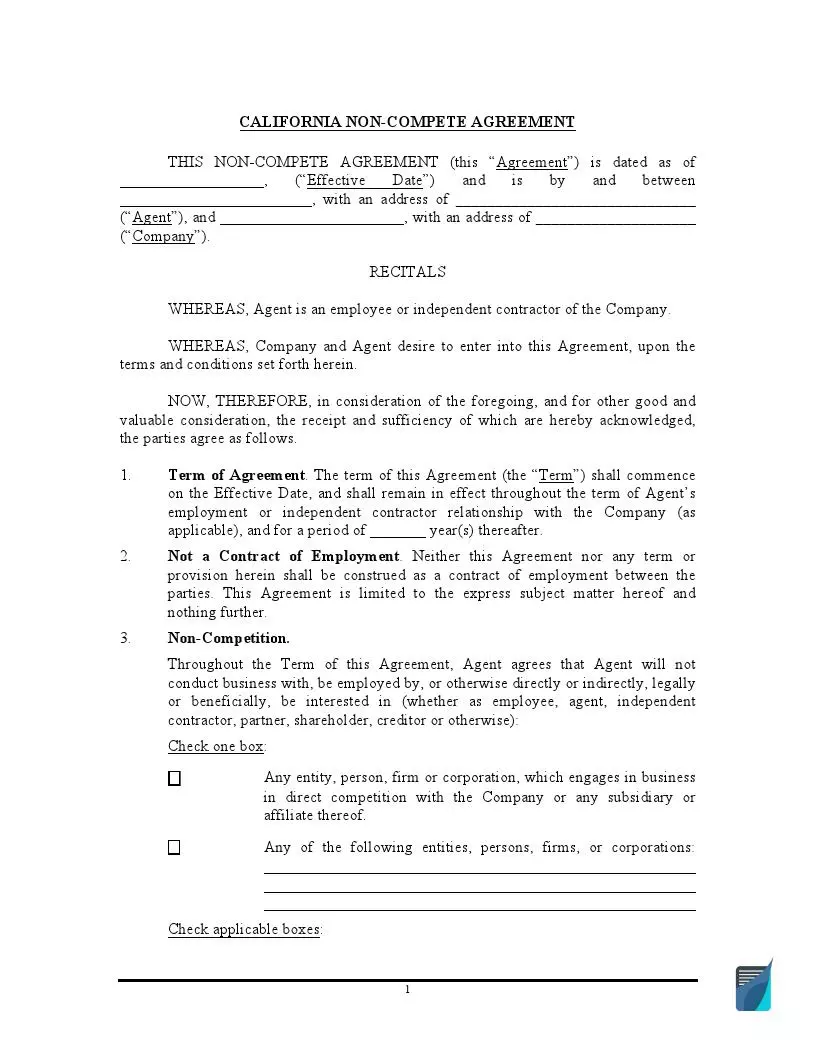California Non-compete Agreement Template
A Non-Compete Agreement (also known as NCA) is a contract between the employer (usually referred to as “Company”) and the employee (usually referred to as “Recipient”). The document mainly serves one general function: to protect the company’s production details from being publicly disclosed. It is usually achieved by signing an official paper when hiring a new worker.
According to this document, the employee cannot start a competing business when working for the subject Company or apply for a position at its direct competitors.

Build Your Document
Answer a few simple questions to make your document in minutes
Save and Print
Save progress and finish on any device, download and print anytime
Sign and Use
Your valid, lawyer-approved document is ready
The Recipient is also prohibited from sharing confidential information they used to handle within the Company. The confidential information may include:
- Clients’ and customers’ personal information
- Staff members’ personal information (including salaries)
- The company’s manufacturing methods and practices
- The company’s new ideas and future products
Every state in the USA has its legislative peculiarities concerning the non-compete agreement template signing and compiling process. However, most forms have a similar structure.
Terms and Conditions
The first section refers to special conditions that every subject employee must comply with. It is a broad section that comprises:
- The validity period and the timeframe when the subject worker cannot violate the agreement terms.
- Geographical area (location) where the NCA is applicable.
- The punishment for an employee who fails to comply with the agreement. It can be a penalty, short-term confinement, or both.
- The exact information and procedures the subject worker has to keep secret, including knowledge of specific actions.
- Additional components, depending on the sphere of business.
Parties
As we have already mentioned, there are two main parties to the Non-Compete Agreement—the employer (named “Company”) and the employee (named “Recipient”).
Dates and Signatures
Any official document requires a commencement date (the date when it comes into force), essential terms and conditions, termination date, and the parties’ signatures.
Popular Local NCA Forms
Non-compete clauses are acknowledged and enforced to some degree by the majority of states in the US, which makes them fairly widespread among many companies. Read more about the most common states requested by our visitors in terms of non-compete contracts.
California NCA Laws and Restrictions
Since every US state has local statutes and codes, California is no exception. State laws recognize such documents as Non-Compete Agreements invalid. The California Business and Professions Code (Section 16600) states that any contract limiting one’s possibilities to engage in a lawful profession, career path, business partnership, or trade is void to that particular extent (unless otherwise suggested in the corresponding Code Chapter).
The purpose of such a law is to protect local employees from being deprived of their accustomed work and professional aspirations if they need to leave their previous workplace. However, the law includes some clarifications regarding business transferring from one owner to another. If a person decides to sell the “goodwill of the business,” its operating assets, or ownership share, the parties must conclude a binding NCA to counter monopoly creation.
According to the California Business and Professions Code, a person who violates the agreement will be subject to punishment under the court’s decision.

Here are other California templates downloaded by FormsPal visitors. Check out our step-by-step creator to customize these forms to your requirements.
